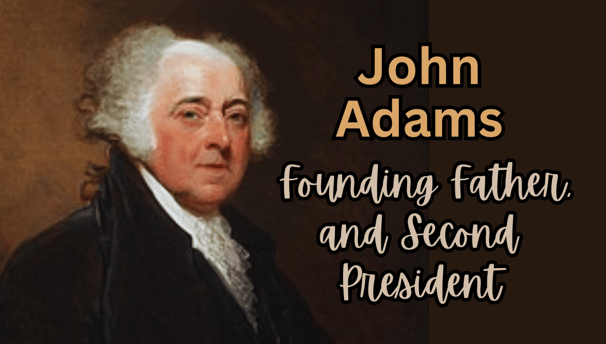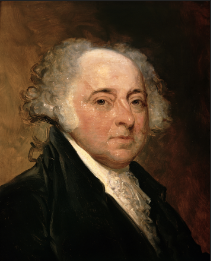John Adams: Founding Father and Statesman
John Adams, a revered Founding Father of the United States, played a crucial role in the nation's early history, contributing significantly to its independence, diplomacy, and governance. Born on October 30, 1735, in Braintree, Massachusetts (now Quincy), Adams devoted his life to public service, legal expertise, and unwavering commitment to the principles of liberty and justice.1
Casey Adams
11/24/20234 min read


Early Life and Education
Born in Braintree (now Quincy), Massachusetts, to a modest but respected farming family, John Adams was the eldest son of John Adams Sr. and Susanna Boylston.
His upbringing in a Puritan household instilled in him a strong work ethic and a passion for education.
Adams attended Harvard College, graduating in 1755, where he initially pursued theology but later turned to law. By 1758, he had been admitted to the bar, and his legal career began to thrive.
Adams married Abigail Smith in 1764, forming a lifelong partnership that profoundly influenced his personal and political life.
Abigail Adams was not only his wife but also a trusted adviser and correspondent, providing insight and counsel throughout his career.
Their relationship produced a remarkable political dynasty, with their son John Quincy Adams later becoming the sixth president of the United States.
Legal Career and Early Activism
John Adams made his first significant mark in colonial America as a lawyer dedicated to the principles of justice and fairness.
His defense of British soldiers after the Boston Massacre of 1770 exemplifies this commitment.
Despite intense anti-British sentiment, Adams ensured they received a fair trial, successfully arguing that the soldiers acted in self-defense.
This act of integrity earned him respect but also skepticism from Patriots wary of his impartiality.
Adams's growing discontent with British policies, such as the Stamp Act and the Townshend Acts, positioned him as a vocal critic of British authority.
His writings, including A Dissertation on the Canon and Feudal Law, articulated the colonial opposition to British overreach and laid the groundwork for his leadership in the American Revolution.
Role in the American Revolution
As a Massachusetts delegate to the First and Second Continental Congresses, Adams emerged as a leading advocate for independence.
He was a principal voice in urging the colonies to sever ties with Britain.
In 1776, he worked alongside Thomas Jefferson, Benjamin Franklin, Roger Sherman, and Robert R. Livingston as part of the Committee of Five tasked with drafting the Declaration of Independence.
While Jefferson penned the document, Adams was its most fervent champion during congressional debates, earning him the title “the Colossus of Independence.”
Adams also contributed significantly to the revolutionary cause through his diplomatic efforts.
During the Revolutionary War, he served in Europe, negotiating critical alliances and securing loans from the Dutch to sustain the fledgling American government.
His work culminated in the Treaty of Paris (1783), which formally ended the war and recognized American independence.
Architect of Government
Adams’s influence extended to the creation of governance structures in both Massachusetts and the United States.
He authored the Massachusetts Constitution of 1780, a model of republicanism that inspired the U.S. Constitution.
His political philosophy, detailed in his essay Thoughts on Government, advocated for a balanced government with checks and balances, principles that became cornerstones of American democracy.
Vice Presidency and Presidency
John Adams became the nation’s first vice president in 1789, serving under George Washington.
Though the office was largely ceremonial at the time, Adams's meticulous records and observations of Senate proceedings laid the foundation for the vice presidency's role.
In 1796, Adams succeeded Washington as the second president of the United States, narrowly defeating Thomas Jefferson.
His presidency was marked by significant challenges, including the Quasi-War with France and internal divisions within the Federalist Party.
Adams’s insistence on neutrality during the French Revolutionary Wars drew criticism from Jeffersonian Republicans and Alexander Hamilton’s Federalist faction.
Adams signed the controversial Alien and Sedition Acts, which restricted immigration and curtailed free speech.
While intended to strengthen national security, these acts were widely criticized as overreaching and politically motivated.
Nonetheless, Adams avoided full-scale war with France by pursuing diplomacy, a move later acknowledged as a wise but politically costly decision.
Election of 1800 and Retirement
Adams’s presidency ended in defeat during the contentious election of 1800, in which Thomas Jefferson triumphed.
The loss marked the beginning of a peaceful transfer of power between political parties, setting a crucial precedent for the young republic.
Following his presidency, Adams retired to his farm in Quincy, Massachusetts. In his later years, he resumed correspondence with Thomas Jefferson, rekindling a friendship that had been strained by political rivalry.
Their letters, rich with reflections on the Revolution and governance, remain an invaluable historical record.
Legacy and Death
John Adams’s legacy as a statesman, philosopher, and defender of justice is profound.
He was one of the few early American leaders who never owned slaves, a reflection of his commitment to liberty and equality, though his views on race and class remained complex.
His contributions to independence, governance, and diplomacy laid the groundwork for the nation’s development.
Adams lived to see his son, John Quincy Adams, ascend to the presidency, a testament to the enduring influence of the Adams family in American politics.
On July 4, 1826, the fiftieth anniversary of the Declaration of Independence, Adams passed away at the age of 90.
His final words, “Thomas Jefferson still survives,” were poignant, though Jefferson had died earlier that same day.
Historians’ Perspectives
Historians generally rank Adams favorably, appreciating his foresight, intellect, and dedication to the fledgling republic.
While his presidency faced challenges and controversies, his commitment to principle over popularity set a standard for public service.
As one of the earliest architects of the United States, John Adams remains a figure of immense respect and admiration, embodying the ideals and complexities of the nation’s founding era.
References:
McCullough, David. "John Adams." Simon & Schuster, 2001. ↩
Ellis, Joseph J. "First Family: Abigail and John Adams." Knopf, 2010.




John Adams

